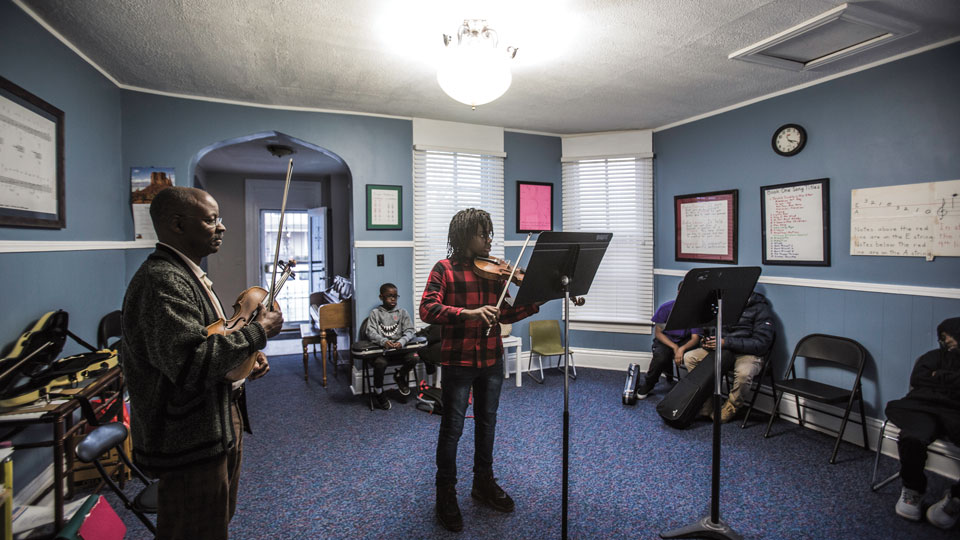Photo by Mickie Winters
If the walls of the Blue House on 28th Street could talk, they would sing. They would croon along to the hum of violins that fill them on a busy Wednesday after school, as music students play the likes of Handel and Bach, gearing up for solo recitals.
On this February afternoon, Keith Cook, the founder of the Blue House — formally the West Louisville Talent and Education Center — works with a 16-year-old girl who has been taking the free lessons since she was six. With cold and squeaky new strings, she bows through a concerto’s tricky bits, accompanied by a pianist. Cook, 65 with a still-boyish face, stands back, observing with his ears. After, the three collaborate at a music stand, talk tempo.
The room is bright with afternoon sun. It lights the posters on the walls: hand-drawn finger charts and staffs, a ’90-era Louisville Orchestra print of a close-up of a violin neck. Cook was in the LO as a violinist until two decades ago when he took leave to teach at elementary schools. “There, I noticed kids with behavioral problems. Always in the red,” says Cook, who believes music is the remedy to these issues and wanted a special music program for the inner-city community. (He’d taught the Japanese-style Suzuki method — learning to play by ear — in more privileged areas before.) In 1997, he started out with two beginner students. Now, one of them is an Arts Reach mentor and the other works at the U of L School of Music.
In the early days, the rental house on 28th Street was supposed to be a temporary location. Now, the house is 116 years old and the recipient of recent donation-driven renovations: a new roof, where once it had been falling in; new drywall, painted a smooth blue; royal-blue carpeting, speckled with Funfetti colors; a rainbow-esque stained-glass treble clef above a door. “We have light fixtures for the first time ever,” Cook says. A mom in the waiting room likens it to an ugly duckling story.
There are 41 students and “four waiting to start any day once I get a crack in the schedule,” Cook says. The youngest is five years old, bowing through the basics. “Violin is one of the few instruments that can be miniaturized without changing the pitch of the instrument. With young players, they’re very concrete thinkers. You have to demonstrate for them, so they can see where to place their fingers,” says Cook, who received a violin for his seventh birthday. His dad was a band teacher and each summer Cook learned a new instrument. One summer, French horn. The next, piccolo. Violin stuck, though, and he later joined the rarity of a string program at his still-segregated school. “Part of the civil-rights struggle was to try to do the best you can at anything,” he says. “There seems to be more stereotypes now. Now, you’re expected to do certain things if you’re a certain race. That’s not the dream that Martin Luther King Jr. had. It was to do anything. I wanted to try to recapture some of that and give kids more of an option.”
This originally appeared in the March 2018 issue of Louisville Magazine. Every story in our March issue is about west Louisville, and we’ve barely scratched the surface. Click here to read more from part four of our series on the West End.
To subscribe to Louisville Magazine, click here. To find us on newsstands, click here.


